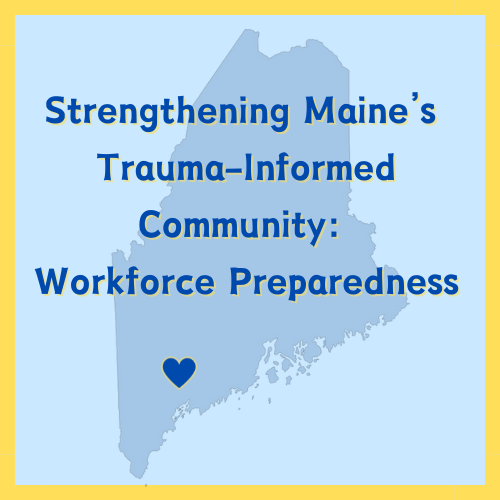Description
August 21-22, 2024 | 9:00am-4:00pm
Virtual via Zoom
This training is intended for Maine clinicians working with individual clients. Clinicians who have worked with victims or persons affected by the mass violence event in Lewiston will be prioritized.
Description:
Multidimensional Grief Therapy (MGT) is an evidence-informed, assessment-driven intervention designed to reduce maladaptive grieving (grief that keeps kids “stuck” and unable to adjust), promote adaptive grieving (grief that helps kids to feel and cope better after a death), and help children and adolescents, aged 7-18, who have experienced bereavement lead healthy, happy, productive lives. MGT is designed to directly address the three dimensions of grief as described in Multidimensional Grief Theory (i.e., separation distress, existential/identity distress, and circumstance-related distress). This two-day training utilizes various teaching methods (i.e. PowerPoints, handouts, case illustration, question & answer, and more), focusing on MGT’s (a) the two-phased approach, (b) primary intervention objectives and practice elements for each phase, and (c) hands-on experiential exercises designed to strengthen key skills needed to implement each phase. Training in Phase 1 is intended for any adult who works with bereaved youth. Training in Phase 2 is intended for individuals with a clinical degree (Master’s level, PhD, PsyD) including clinicians, school counselors, professional counselors, social workers, marriage and family therapists, LSSP’s, and psychologists.
Learning Objectives:
Day 1
1. Recognize developmental differences in children’s understanding of death.
2. Identify the three primary dimensions of grief as explained in Multidimensional Grief Theory.
3. Utilize specific practice elements to help youth reduce grief-related distress and enhance adaptive grief reactions.
4. Recognize ways that caregivers can support youth to help minimize grief-related distress and enhance adaptive coping.
5. Recognize the importance of cultural humility when working with youth who have experienced bereavement.
6. Distinguish between loss and trauma reminders and their respective impact on grief.
Day 2
1. Review risk screening tools used to assess grief reactions and associated psychological distress in youth.
2. Identify key components of a loss narrative.
3. Recognize ways in which youth can cope with difficult transitions and life events in the context of bereavement.
4. Utilize techniques to help grieving youth plan for the future.
5. Identify signs of secondary traumatic stress, compassion fatigue, burnout, and recognize strategies to increase resilience.
Rostering
In order to become rostered in Multidimensional Grief Therapy, participants must complete the training in its entirety and track a case by attending 6 monthly case consultation meetings (dates to be determined by participants – please indicate your interest on the registration form).
Presenters:
Marisa Nowitz, LCSW-S, MSW |Marisa Nowitz, MSW, LCSW-S is a Licensed Clinical Social Worker-Supervisor with over twenty years of clinical experience, as well as expertise in education, training, and program development. As Vice President of Education and Training at the Trauma and Grief (TAG) Center, Marisa directs the training program and provides school and community-based trainings in a variety of mental health topics related to supporting youth exposed to trauma and loss. In her previous role at the TAG Center, Marisa supervised a clinical team and provided evidence-based, trauma- and bereavement-focused services as part of the coordinated response efforts in the community of Santa Fe, TX following the tragic school shooting in 2018. Prior to joining the TAG Center, Marisa spent much of her career working as a clinical social worker and supervisor at MD Anderson Cancer Center, creating programming for children whose parents had cancer. Marisa completed her Bachelor’s degree in Psychology from Texas A&M University and a Master of Social Work from the University of Houston.
Julie Kaplow, Ph.D., ABPP |Julie Kaplow is a licensed clinical psychologist, board certified in Clinical Child and Adolescent Psychology. She serves as Executive Vice President of Trauma and Grief Programs and Policy at the Meadows Mental Health Policy Institute and Executive Director of the Trauma and Grief (TAG) Center at The Hackett Center for Mental Health in Houston. Dr. Kaplow is also Executive Director of the TAG Center at Children’s Hospital New Orleans and Professor of Psychiatry at Tulane University School of Medicine. She is also CEO of the Lucine Center for Trauma and Grief, a group practice that provides no-cost teletherapy to youth exposed to traumas and losses across the states of Texas and Louisina. In these roles, she oversees the development and evaluation of treatments for traumatized and bereaved youth and disseminates trauma- and bereavement-informed “best practices” to community providers nationwide. Following tragedies such as Hurricane Harvey and the Santa Fe school shooting, Dr. Kaplow and her team provided evidence-based risk screening and interventions to impacted children and families. More recently, they have been conducting and coordinating trainings for school- and community-based clinicians throughout Uvalde, Texas following the Robb Elementary School shooting. Dr. Kaplow has published widely on the topics of childhood trauma and grief and has served as Principal Investigator on numerous grant-funded programs focused on enhancing resilience in youth exposed to adversity. She is lead author of Multidimensional Grief Therapy, co-author of Trauma and Grief Component Therapy for Adolescents, and co-author of Trauma Systems Therapy. Dr. Kaplow has served as a consultant to the DSM-5 Sub-Work Group on Prolonged Grief Disorder, the ICD-11 Work Group on Disorders Associated with Stress, the National Academy of Medicine (Scientific Advisory Council on Child Death), and the Mass Violence and Children Working Group of the FBI. Prior to joining the Meadows Mental Health Policy Institute, Dr. Kaplow served as Chief of Psychology and Vice Chair for Behavioral Health at Texas Children’s Hospital/Baylor College of Medicine. She received her BA in Psychology from the University of Michigan and her PhD in Clinical Psychology from Duke University. She completed her internship at Boston Children’s Hospital/Harvard Medical School followed by postdoctoral training at the Center for Medical and Refugee Trauma at Boston Medical Center.
Contact hours:
12 contact hours for social workers, licensed clinical professional counselors, and behavioral health professionals
12 category I contact hours for psychologists. CCSME is a pre-approved sponsor and provider of Professional Education Activities for Psychologists.
12 contact hours for Alcohol and Drug Counselors pending approval from the Maine Board of Alcohol and Drug Counselors.
12 contact hours for CHES. CCSME is a designated provider of continuing education contact hours (CECH) in health education by the National Commission for Health Education Credentialing, Inc.
Financial support is available to clinician participants with billable hours for both the training and consultation. Please contact Casey at ccoddaire@ccsme.org once you have registered if you would like to accept this financial support.
To request accommodations, please contact Casey at ccoddaire@ccsme.org.
Attendees are required to be present for 100% of all training sessions and complete the course evaluation in order to receive a certificate. Partial credit will not be awarded.
This training is supported by grant number 1H07SM089706-01 from the Substance Abuse and Mental Health Services Administration (SAMHSA). The content of this publication does not necessarily reflect the views or polices of SAMHSA or the U.S. Department of Health and Human Services (HHS).




